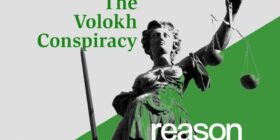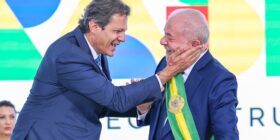The WilmerHale Complaint
Further to Eugene’s post about the TRO that was entered in the suit filed by WilmerHale against the Trump Administration Executive Order, I highly recommend taking a look at the Complaint filed by the Paul Clement-Erin Murphy firm. The first six pages or so is as eloquent a defense of an independent legal enterprise as you are likely to read. 13. The Order violates the separation of powers twice over. The President’s role is to enforce the law—not to create […]
Políticos de toga [Verse] O Brasil vive situação… Luiz Carlos Guglielmetti
Políticos de toga [Verse] O Brasil vive situação delicada, onde um ditador faz tudo e não paga por nada, e a justiça foi escanteada. [Chorus] Um crime sem prova, um golpe sem arma, uma reunião secreta que foi gravada. [Verse] Cinco juízes de gravata e saia, antes o réu tivesse sitio em Atibaia. O julgamento orquestrado, antes o réu fizesse o petrolão. ou distribuido dinheiro no sacolão, antes fizesse o Mensalão. [Chorus] Um crime sem prova, um golpe […]
🔴🔵No recording! I did, now what? I kick you out. Good luck with that 1st amendment audit🔴🔵
submitted by /u/NCTyrantHunter [link] [comments]
Bolsonaro convoca para ato pela anistia na Avenida Paulista
O ex-presidente Jair Bolsonaro convocou seus apoiadores para uma manifestação que ocorrerá no próximo domingo, 6 de abril, na Avenida Paulista, em São Paulo. O ato tem como objetivo pressionar os congressistas pela aprovação da anistia a todos os envolvidos nos atos de 8 de janeiro de 2023. O ex-presidente citou a história da cabeleireira Débora dos Santos e destacou que este não é um caso isolado. “Existem muitas outras Déboras”, relata. “Muitas outras mães afastadas arbitrariamente de […]
L’État, C’est Moi (‘I Am the State’).Trumpian Version
Can we get down to the brass tacks here? As much as the MAGA folks and friends would like to believe that Trump’s Golden Age of American Prosperity is steaming down the pike, and giving him full credit for slaying a lot of political devils like DEI, green energy, weaponizsation of the DOJ/FBI, getting boys out of the girls’ swim lanes, ending the disaster in Ukraine, standing up Elon Musk and the DOGE boys, canceling the penny and […]
Warrants allege Forest Park officer arrested in stalking case threatened Delta staff with ex-girlfriend’s account, got her questioned by TSA
submitted by /u/mrwatkins83 [link] [comments]


![Políticos de toga [Verse] O Brasil vive situação... Luiz Carlos Guglielmetti Políticos de toga [Verse] O Brasil vive situação... Luiz Carlos Guglielmetti](https://digitado.com.br/wp-content/uploads/2025/03/luiz_carlos_politicos_de_toga_verse_o_brasil_vive_situa_trf_nlg5d0po-rw5kAr-280x140.jpeg)

